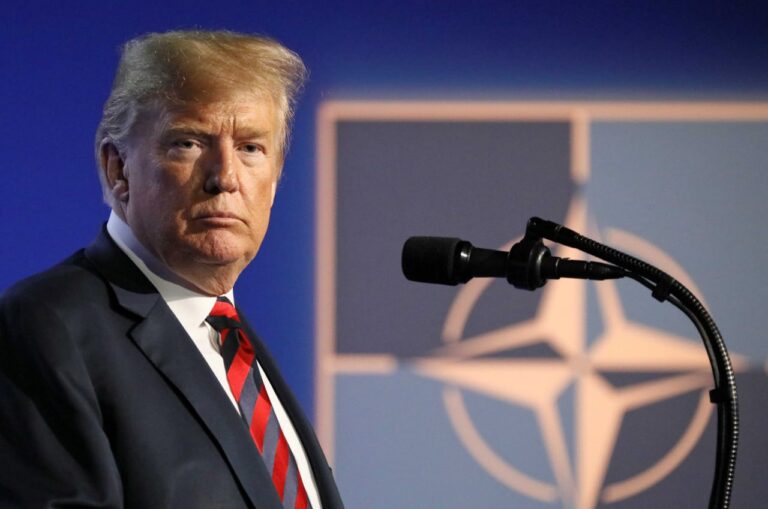The U.S. President Donald Trump’s skepticism toward NATO and opposition to Ukraine’s membership in the alliance have raised concerns about the long-term viability of transatlantic security cooperation. His stance weakens U.S. influence in European security matters and compels European allies to reassess their defense strategies, including the potential creation of an independent military-political bloc led by France, Germany, the UK, and Italy.
Trump has consistently criticized NATO, calling it obsolete and questioning the financial contributions of member states. His resistance to Ukraine’s NATO membership aligns with his broader skepticism toward U.S. security commitments in Europe. The key aspects of his stance include:
- Opposition to Further NATO Enlargement: Trump views NATO expansion as a provocation toward Russia and a burden on U.S. defense resources.
- Transactional Approach to Alliances: He emphasizes a cost-benefit analysis, urging European allies to increase their military spending.
- Reduced U.S. Leadership in NATO: Trump’s reluctance to support Ukraine’s accession weakens American influence in European security matters.
- After 1945, the U.S. played a central role in shaping the global order:
- NATO (1949): Created to deter Soviet aggression and ensure European security under U.S. leadership.
- Marshall Plan (1948): Rebuilt war-torn Europe, preventing the spread of communism.
- Military Presence: U.S. bases in Germany, Italy, and elsewhere provided stability and deterred adversaries.
- Leadership in Global Institutions: The U.S. helped establish the UN, IMF, and World Bank to foster stability and economic growth.
- 2. How Trump’s Policies Undermine This Legacy
- Weakening NATO’s Credibility: Trump’s threats to withdraw from NATO and demands for European countries to “pay more” create doubts about U.S. commitment. This emboldens adversaries like Russia.
- Encouraging European Strategic Autonomy: His rhetoric forces Europe to consider alternatives, such as an EU-led defense bloc (France, Germany, Italy, UK). This could reduce U.S. influence over European security.
- Questioning the U.S. as a Reliable Partner: Allies are increasingly uncertain whether the U.S. will defend them in a crisis, which weakens American diplomatic leverage.
- Risking a Power Vacuum: If the U.S. retreats, Russia or China could exploit divisions in Europe to expand their influence, undermining Western cohesion.
- 3. Long-Term Consequences for the U.S.
- Loss of Strategic Influence: If Europe develops its own military structures, it may act independently from U.S. interests.
- Erosion of the Transatlantic Alliance: The U.S. could lose key allies in shaping global security policy.
- Greater Instability: A fragmented Western alliance could make future conflicts (e.g., Russian aggression, cyber warfare, terrorism) harder to manage.
- By retreating from European security commitments, Trump risks dismantling the post-WWII order that has kept Europe stable and the U.S. dominant. This could be seen as one of the most significant reversals of American foreign policy in modern history.
Trump’s skepticism toward U.S. security commitments in Europe stems from several key factors:
1. “America First” and Isolationist Tendencies
Trump’s foreign policy emphasizes prioritizing U.S. domestic interests over international alliances. He sees NATO commitments as costly obligations that do not directly benefit the U.S.
2. Burden-Sharing Concerns
Trump has repeatedly criticized NATO allies for not meeting the 2% GDP defense spending target. He argues that the U.S. unfairly bears the financial burden of European defense while European countries free-ride on American military power.
3. View That NATO Provokes Russia
Trump has suggested that NATO’s expansion into Eastern Europe unnecessarily antagonizes Russia. He has questioned whether defending smaller states, like Montenegro, is in the U.S. national interest.
4. Skepticism Toward Multilateral Institutions
Trump generally distrusts international organizations, viewing them as bureaucratic and ineffective. He prefers bilateral negotiations, where the U.S. has more leverage, over collective security agreements.
5. Economic Priorities Over Strategic Alliances
Trump tends to view international relations through an economic lens, focusing on trade imbalances rather than strategic military commitments. He sees NATO as a financial drain rather than a vital security alliance.
6. Preference for Deal-Making Over Long-Term Alliances
Rather than relying on formal military alliances, Trump favors personal diplomacy and one-on-one negotiations with world leaders, including Vladimir Putin. This approach undermines traditional alliance structures.
7. Belief That Europe Should Defend Itself
Trump has repeatedly suggested that Europe should take primary responsibility for its own security. He has even hinted at withdrawing U.S. troops from Europe, forcing allies to consider alternative security arrangements.
Trump’s opposition to NATO enlargement erodes U.S. leadership in European defense in the following ways:
- Erosion of NATO’s Deterrence Posture: A weakened U.S. commitment may embolden Russian aggression in Eastern Europe.
- European Uncertainty: Allies question Washington’s reliability, prompting discussions about greater European defense autonomy.
- Potential Shifts in Alliance Dynamics: European countries may seek alternative security arrangements outside of NATO’s traditional framework.
If NATO’s cohesion weakens, a European-led security bloc could emerge, primarily driven by France, Germany, the UK, and Italy. Key characteristics of such an alliance include:
- Autonomous European Defense Initiatives: Expansion of existing frameworks like the European Defense Fund and Permanent Structured Cooperation (PESCO).
- Enhanced Military Integration: Joint military commands and increased coordination on defense procurement.
- Limited Dependence on the U.S.: Strategic independence from Washington in case of future NATO uncertainty.
Pros and Cons of a European-Led Defense Bloc
Pros:
- Strengthened European strategic autonomy;
- Greater responsiveness to regional security threats;
- Enhanced defense industrial cooperation;
Cons:
- High financial costs and logistical challenges;
- Potential for divisions among European states;
- Weaker collective deterrence without U.S. military power;
A restructured security alliance in Europe could resemble the Western European Union (WEU), a Cold War-era military organization. However, differences exist:
- The WEU was largely inactive, whereas a new alliance would require a proactive security posture.
- Unlike NATO, a European bloc would lack the nuclear umbrella provided by the U.S.
- Political consensus within Europe remains uncertain, given diverging national interests.
If NATO weakens under Trump’s policies, the U.S. faces several strategic challenges:
- Diminished Global Influence: A fractured NATO would reduce America’s ability to shape European security.
- Stronger Russian Geopolitical Position: Russia could exploit divisions within the West.
- Increased European Defense Expenditures: U.S. defense industries might lose European contracts as the EU prioritizes internal production.
Trump’s resistance to NATO’s expansion is driven by several factors:
- Desire to Reduce U.S. Military Commitments: Prefers burden-sharing among allies.
- Belief That NATO Provokes Russia: Sees expansion as a threat to U.S.-Russia relations.
- Isolationist Tendencies: Favors prioritizing domestic issues over global security commitments.
Trump’s NATO policies have far-reaching implications, challenging the alliance’s stability and pushing European allies toward alternative security arrangements. While a European-led defense bloc could emerge, it would face challenges in replacing NATO’s capabilities. A weakened NATO could diminish U.S. global influence and embolden adversaries, raising serious concerns for transatlantic security. Moving forward, the U.S. and its allies must reassess their commitment to collective defense to prevent a geopolitical vacuum that could benefit rivals like Russia and China.




